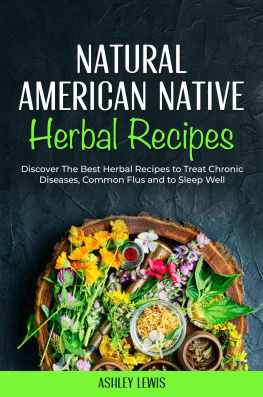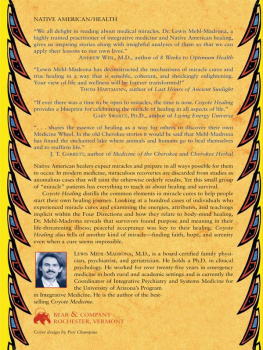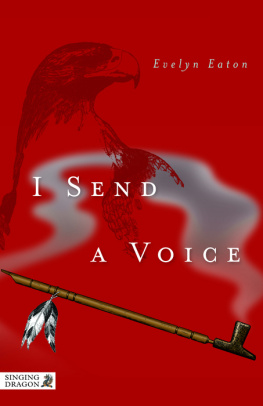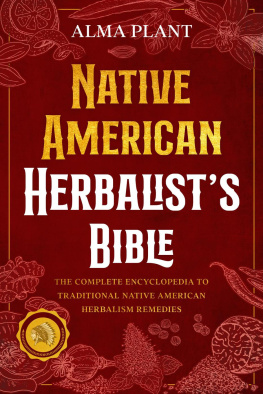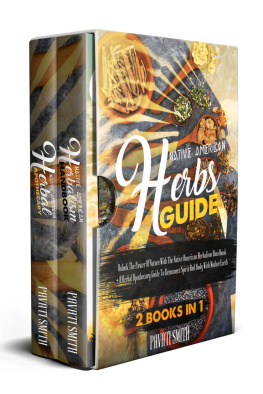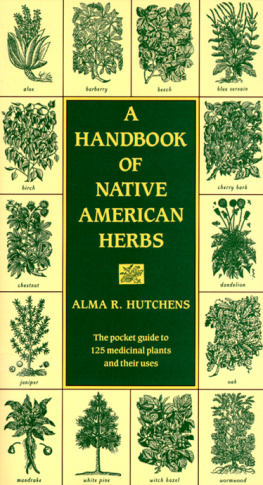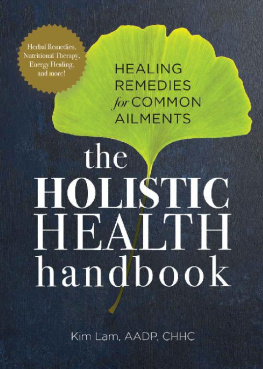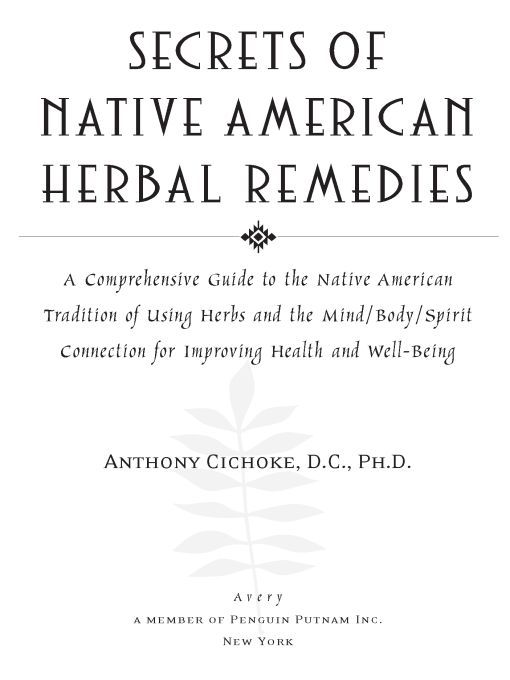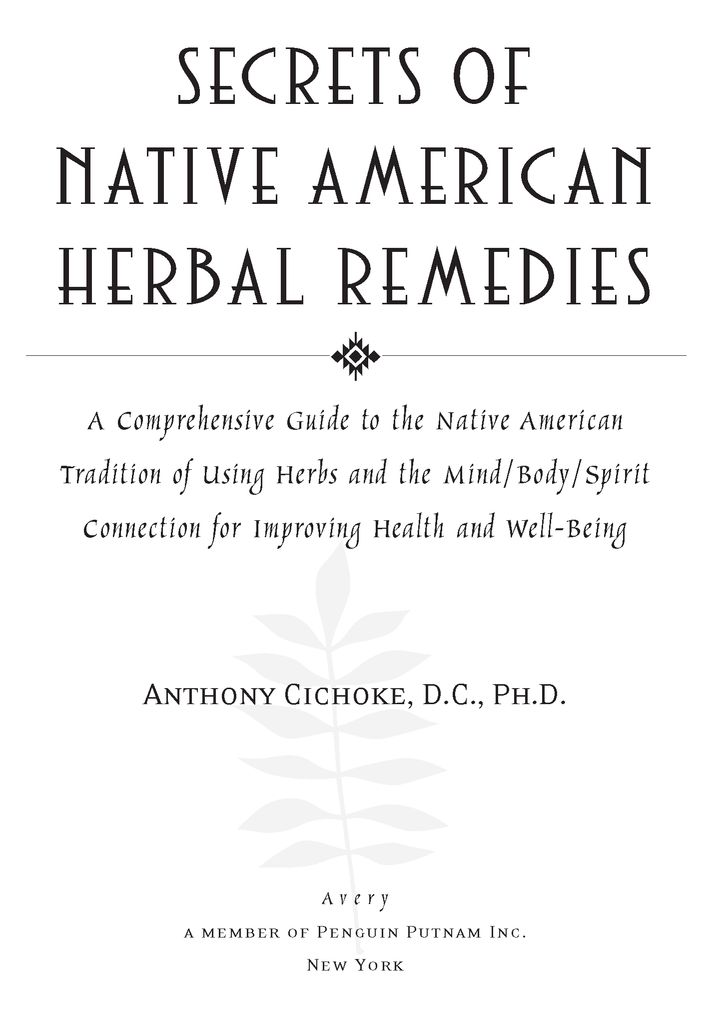Table of Contents
THIS BOOK IS DEDICATED TO THE MEMORY OF Vern Sonny Johnson, Jr. He was a Native American, a member of the Lummi Nation, a talented woodcarver, and a dedicated fighter for improved water quality. When diagnosed with stomach cancer, Vern returned to the old traditional ways of healing, integrating them into his therapy program. He turned to herbal medicines and American Indian remedies (including the sweat lodge) and spent four days at New Mexicos Ojo Caliente Hot Springs, soaking in and drinking the healing waters. Vern never gave up, and he lived years longer than the few weeks predicted by practitioners of organized conventional medicine. He was a hero and a credit to his family, the Lummi Nation, Native Americans, and all humankind. By returning to the old ways of his people, he showed us how to fight illness and extend life... with dignity.
Thank you, Vern, it was an honor knowing you. I dedicate this book to you and to each persons search for the true dignity of life.
Acknowledgments

Id like to thank the following individuals and institutions for their encouragement, cooperation, informational materials, and assistance in helping to complete this book: James R. Bowman, Ruby Windspirit, the DeGalger Library (Southern Methodist University), Daniel Gagnon, Paula Wallis, Armand Minthorn, E. Thomas Morning Owl, the Confederated Tribes of the Umatilla Indian Reservation, Althea Wolf, Tamas Tslikt Cultural Institute, Michael Moore, Steven Dentali, Phyllis Hogan, Donna Chesner, D. E. Moerman, Malissa Minthorn, Carl and Bobbi Sampson, Anita Paz, Cecilia Carpenter, Edward Alstat, Rick Stewart, Big Dave Archambault, Wilfred Klingsat, Wilmer Mesteth, Birgil Kills Straight, James Duke, Little Dave Archambault II, Jewell James, Vern Johnson, the Lummi Indian Nation, Northwest Indian College, Nancy Carroll, Kenny Cooper, Henry M. Cagey, Ruth and Ted Solomon, Tom Edwards, Cynthia Wilson, Sid Williams, Florence Kinley, Chip Richie, Steven Heape, Rich-Heape Films, Inc., Roger Canard, Freita Kelliche, Indian Country Today, Rita White Butterfly, Helen Felix Baco, Kevin Peniski, Jeff Schiller, National College of Naturopathic Medicine Library, Eclectic Library, Eclectic Institute, Life University, Cleveland Chiropractic College, David Schiller, Rod Jones, Jan Nicholas, Janet Zand, Beatriz Steeghs, Tierona Low Dog, Shirley Hankins-Carlisle, the American Indian Chamber of Commerce of Texas, the Confederated Tribes of Warm Springs, Oregon, and Katie Cichoke and William Cichoke.
A huge thanks goes to the helpful employees of the libraries of America and especially of the West Slope Library in Portland, Oregon, for their hard work and never-ending cooperation.
Special thanks to Norman Goldfind and Rosa Goldfind for their constant help, and to my secretary, Mrs. Karen Hood, for all of her assistance in the preparation of this book, including research, typing, and editing. Thanks also to proofreader Beata Szewezk, to Dara Stewart and Laura Shepherd at Avery for their special work as editors, and to John Duff for his support.
Finally, my eternal thanks to my wife, Margie, for her continuous assistance and for enduring the mountains of paper in our house these past three years.

PREFACE
This American Indian herbal book gives you simple, yet effective herbal remedies to fight specific health conditions. With a brand-new approach to traditional information, this book shows you how to help yourself and how to take charge of your life.
Until quite recently, most Americans believed that only prescription drugs, surgery, chemicals, radiation, or some other scientific treatmentadministered and sanctioned by a medical doctorcould cure illness or injury. But sadly, this crisis approach has resulted in a failing health-care system with skyrocketing costs. In 1960, our national health expenditures were 5 percent of the gross national product (GNP). By 1990, that figure exceeded 12 percent, and by 1996, health expenditures amounted to more than 13.6 percent of the GNP. That equates to over one trillion dollars, and its still climbing! Sadly, modern health care is so expensive that its not uncommon for a family to lose their life savings fighting a serious medical conditioneven if theyre fortunate enough to have health insurance. Todays orthodox health care is too impersonal and too expensive. It stresses crisis therapy (rather than prevention) and offers questionable results. In fact, on a per-capita basis, the present U.S. health-care system costs more than any other in the world but ranks only thirty-seventh in terms of quality of care, according to an analysis by the World Health Organization.
More and more people are actively looking for alternatives to orthodox medicine. People are returning to their roots, back to traditional health care. And in so doing, they are finding effective ways of healingnaturally. As with the American Indians, who learned how to help themselves, people are learning how to walk in harmony with nature, and how to balance their lives. They are also learning the importance of believing in the power of the Creator.
How striking that with the most advanced medical system in the world, the most exotic drugs, the best and most expensive equipment, and the most advanced surgical techniques available anywhere, people are returning to the old traditional ways in hordes. People are looking beyond the establishment for health care. In fact, in the past year, some 50 percent of all adults between the ages of thirty-five and forty-nine have used some form of alternative health care. In 1997, Americans made approximately 629 million visits to alternative medicine practitioners, including herbalists, chiropractors, naturopaths, homeopaths, acupuncturists, and spiritual healers. In fact, more people visited alternative health-care practitioners than visited conventional primary-care physicians! Isnt the use of the term alternative ironic, then? After all, what we now call alternative is actually thousands and thousands of years old. It would seem to me that modern, orthodox medicine should be called alternative instead.
The times are changing in the medical community as well. More and more doctors, scientists, and healers are integrating alternative or complementary (adjunctive) medicine and therapies into their practices. Organized medicine is beginning to view alternative methods and traditional herbal medicine more seriously. In fact, the Journal of the American Medical Association devoted an entire issue to alternative medicine (November 18, 1998).
Alternative health care is nothing new to me; I learned it, quite literally, at my fathers knee. My father, Dr. Anthony J. Cichoke, Sr., was the first chiropractor to receive a license from the state of Illinois. For more than forty years, I watched my father heal people by employing many of the practices used effectively by the American Indians. He combined a body, mind, and spirit approach to healing, saying a prayer before treating each patient, then laying on hands, and adjusting the patient. In addition, he suggested herbs and other nutrients, as well as healing therapies that would help improve the patients condition. My father drew on information he had obtained from Native American tribes while growing up in Wisconsin, from information from his football days with Jim Thorpe (the famous Native American football player), and from experiences in central Illinois. My father helped many people, as evidenced by the long lines of patients that formed down the outer hall from his office.


